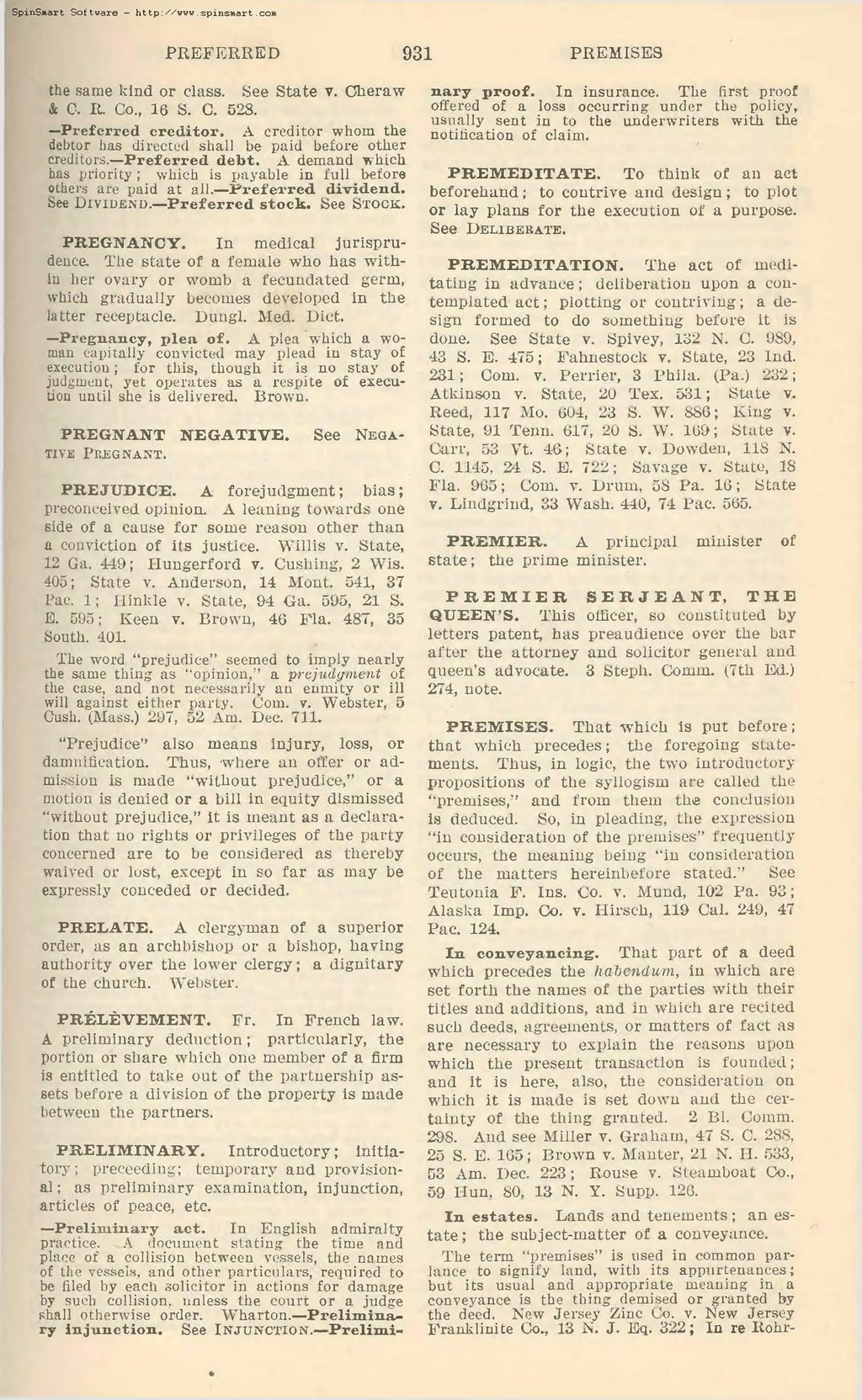the same kind or ciass. See State v. Oheriiw & C. It Co., 16 S. O. 528.
—Pi-eferred creditor. A creditor whom the debtor has directed shall he paid before other cieditors.—Pre£sx-red deiit. A demand which has priority; which is payshie in fuil before others are paid at all.—Pre£eci-red dividend. See DivionNn.—Px-starred stock. See STOCK.
PREGNANCY. In medical jurispru- dence. The state of a tcmaie who has with- in her ovary or Womb ri tecundated germ, which grzidually becomes developed in the letter receptacle. Dungl. Med. Dict. --Pi-egnnnoy, plea of. A plea which a wo- man capitally convicted may plead in stay of execution; for this, though it is no stay of Judgment, yet operates as i). respite of execution until she is tleiivered. Brown.
PREGNANT NEGATIVE. THE PREGNANT.
See NEGA-
PREJIJDICE. A torejudgment; bias; preconceived opinion. A leaning towards one side of ii. cause for some reason other than a conviction of its justice. Wiilis v. State, 12 Ga. 449; Huiigertord v. Cusbing, 2 Wis. -105; State v. Anderson, 14 Mont. 5-11, 37 Put. 1; llinkie v. State, 94 Ga. 595, 21 S. E. 595; Keen v. Brown, 46 Flo. 487, 35 South. 40L
The word "pre,judice" seemed to imply nearly the same thing as "opinion." a prejuiiymeiit of the case, and not necessarily an enmity or iii will against either party. Uom. v. Webster, 5 Cusli. (l\Iiiss.) 297, 52 Am. Dec. 711.
"PreJudlce" siso means injury, loss, or dsmiiification. Thus, where an otter or ad- misslon is mods "without prejudice." or a motion is denied or a bill in equity dismissed "without prejudice," it is meant as s deciaration that no rights or privileges of the party concerned are to be considered as thereby waived or iost, except in so tar as may be expressiy conceded or decided.
PRELATE. A clergyman of a superior order, as an archbishop or a bishop, having authority over the lower clergy; s dignitary or the church. Webster.
i=iu':L}‘:vI:1vti:i~i1'. Fr. In French iii.w. A preiiminury deduction; partlculariy, the portion or share which one member or :1 firm is eutitied to take out of the partnership assets before a division of the property is made between the partners.
PRELIMINARY. Introductory; initiatory: preceeding; temporary and provisional: as preliminary examination, injunction, articles or peace, etc.
—Pi-eliminary set. In English admiralty practice. A document stating the time and place of a collision between vessels, the names of the vessels, and other purficiiiars, required to be filed by each solicitor in actions for drunage by such collision. unless the court or a judge shiiii otherwise order. Wherton.—Prelimin.o.- ry injunction. See INJnNc'r1oN.—Prelim.i-
931
PREMISES
nary proof. In insurance. The first proof offered of II, loss occurring under the policy, usually sent in to the underwriters with the notification of claim.
PREMEDITATE. To think of an act beforehand; to contrive and design; to piot or lay plans for the execution of a purpose. See DELIBERATE.
PREMEDITATION. The act of meditating in advance; deliberation upon s contempiated act; piottuig or contriving: a design formed to do something before it is done. See State v. Spivey, 132 N. U. 989. -13 S. E. 475; Fahnestock v. State, 28 Ind. 231; Com. v. Perrier, B Phiia. (1’a.) 2 : Atkinson v. State, 20 Tex. 5'31; St.-ite V. Reed, 117 Mo. 60-1. 23 S. W. 88 King v. State, 91 Tenn. 61?. 20 S. W. ll} . State v. Carr, 53 Vt. 46; State v. Dowdeu. 118 N. C. 1145, 24 S E. 722-, Savage v. State, 18 Fia. 965; Com. 1'. Drum, 58 Pa. 16; State V. Lindgrind, 33 Wash. 440, 74 Pac. 565.
PREMIER. A principal minister of
state; the pri.ms minister.
PREMIER SERJEANT, THE QUEEN'S. This officer, so constituted by ietters patent, has preaudience over the bar after the attorney and solicitor generai and queen's advocate. 3 Staph. Comm. (7th Ed.) 274, note.
PREMISES. That which is put before; that which precedes; the foregoing statements. Thus, i.n logic, the two introductory propositions of the syi.logism are called the "premises," and from them the conclusion is deduced. So, in pleading, the expression "in consideration of the premises" trequentiy occurs, the meaning being "in consideration of the matters hereinbefore stated." See Teutonia B‘. Ins. Co. v. Mund. 102 Pa. 93; Alaska Imp. Co. v. Hirsch, 119 Cal. 249, 47 Psc. 124.
In conveyancing. That part of a deed which precedes the habcmium, in which are set forth the names of the parties with their titles and additions, and in which are recited such deeds, agreements, or matters of fact as are necessary to explain the reasons upon which the present transaction is founded; and it is here, also, the consideration on which it is made is set down and the certainty of the thing granted. 2 Bi. Uomm. 298. And see Miller v. Graham, 47 S. C. 2 S. 25 S. E. 16.); Brown v. Manter, 21 N. H. " , 53 Am. Dec. 22.3; Rouse v. Steamboat Co., 59 Iiun. 30. 13 N. Y. Supp. 126.
In estates. Lands and tenements; an estate; the subject-matter or a conveyance.
The term "premises" is used in common per- laiice to signify land, with_its appurtenances: but its usual and appropriate meaning in ii conveyance is the thing demised or granted by the deed. New Jeisey Zinc Co. v. New Jersey Frsnkiinite Co., 13 N. J. Eq. 322; In re Ruhr-
